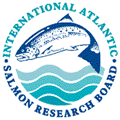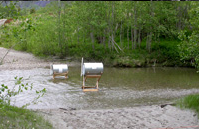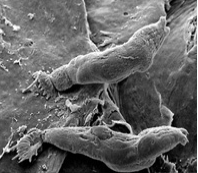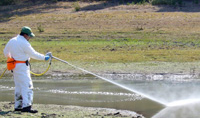Gyrodactylus salaris
Gyrodactylus salaris
One of the major threats to stocks of Atlantic salmon in the freshwater phase is the parasite Gyrodactylus salaris. It is a small parasite (0.5mm in length) infecting the skin, gills and fins of fish and is capable of rapid multiplication.
The parasite is most likely endemic to the rivers draining into the Baltic Sea but has been introduced to Norway, to Atlantic drainages in Sweden and to Rivers draining into the White Sea / Barents Sea in Russia. After its introduction to Norway in the 1970’s and 1980’s G. salaris caused enormous ecological and economic damage and has had a negative impact on populations of Atlantic salmon in the Russian river Keret and possibly also in rivers on the Swedish west coast.
NASCO’s goal is to prevent the further spread of this parasite and to eradicate it from infected areas, working with stakeholders, where appropriate.
Gyrodactylus salaris ‘Road Map’
NASCOs North-East Atlantic Commission (NEAC) has developed a Gyrodactylus salaris ‘Road Map’. This contains recommendations to enhance cooperation on monitoring, research and exchange of information in relation to this parasite and on measures to prevent its spread.
- ‘Road Map’ to enhance information exchange and cooperation on monitoring, research and measures to prevent the spread of G. salaris and eradicate it if introduced.
Reporting under the Road Map can be found in NEAC Annual Meeting Papers.
The Working Group on Gyrodactylus salaris in the North-East Atlantic Commission area
The Working Group on Gyrodactylus salaris in the North-East Atlantic Commission area, meets every three years. It can also be asked to discuss matters at other times.
- 2020 Report of the Working Group on Gyrodactylus salaris: The Synonymisation of Gyrodactylus thymalli and Gyrodactylus salaris. Implications for NASCO
- 2018 Report of the Working Group on Gyrodactylus salaris
- 2017 Report of the Working Group on Gyrodactylus salaris
- 2008 Report of the Working Group on Gyrodactylus salaris
- 2006 Report of the Working Group on Gyrodactylus salaris
World Organisation for Animal Health (OIE)
The World Organisation for Animal Health (OIE) updated its Aquatic Animal Health Code in 2020.



